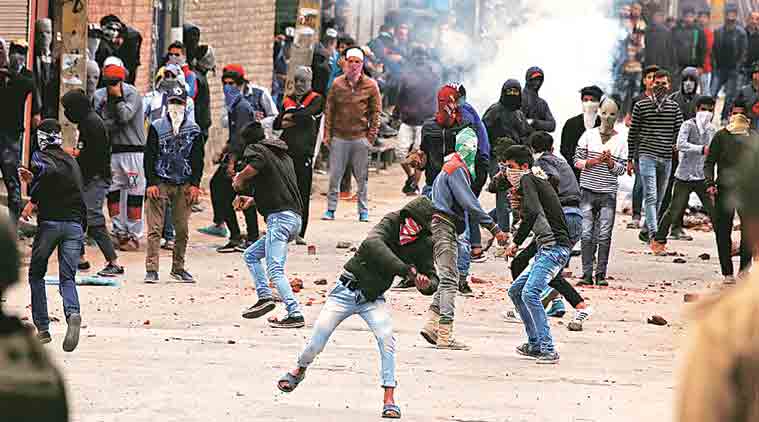- India
- International
India lodges protest over UN report on human rights status in Kashmir
“References to human rights concerns in Azad Jammu and Kashmir (AJK) and Gilgit-Baltistan should in no way be construed to create a false sense of equivalence with the gross and systematic human rights violations in IoK,” the statement said.
 Pakistan said that “this proposal is consistent with Pakistan’s several calls to this effect since 2016″. (Reuters Photo)
Pakistan said that “this proposal is consistent with Pakistan’s several calls to this effect since 2016″. (Reuters Photo)
India reacted angrily after the Office of the United Nations High Commissioner for Human Rights (OHCHR) sought “establishment of a commission of inquiry to conduct a comprehensive independent international investigation into allegations of human rights violations in Kashmir” and asked the governments of India and Pakistan to “fully respect the right of self-determination of the people of Kashmir as protected under international law”.
A 49-page report, titled Report on the Situation of Human Rights in Kashmir: Developments in the Indian State of Jammu and Kashmir from June 2016 to April 2018, and General Human Rights Concerns in Azad Jammu and Kashmir and Gilgit-Baltistan, was submitted Thursday by the OHCHR to the United Nations Human Rights Council.
“The focus of the report is on the situation of human rights in the Indian state of Jammu and Kashmir from July 2016 to April 2018 over which period allegations of widespread and serious human rights violations were received, notably excessive use of force by Indian security forces that led to numerous civilian casualties,’’ the report stated.
The report also took up human rights violations in Pakistan-occupied Kashmir and Gilgit-Baltistan and asked Islamabad to “fully respect international human rights law obligations”.

India reacted sharply to the report, calling it “fallacious, tendentious and motivated”, and lodged a strong protest with the United Nations, saying the government is “deeply concerned that individual prejudices are being allowed to undermine the credibility of a UN institution”.
“The report violates India’s sovereignty and territorial integrity. The entire state of Jammu and Kashmir is an integral part of India. Pakistan is in illegal and forcible occupation of a part of the Indian state through aggression,” the Ministry of External Affairs said in a strongly-worded statement.
The Opposition Congress came out in support of the government: “We reject the UN human rights report as a prejudiced attempt by vested interests to hurt India’s sovereignty and national interests. The Congress supports the government’s stand in dismissing the report. UNHRC has prepared the report remotely with zero understanding of the situation in J&K. How does the report justify terrorism by self-styled militants of JeM and Hizbul Mujahideen? Should the UN overlook the state-sponsored terrorism being exported to Indian soil by Pakistan?” Congress communication department head Randeep Surjewala said.
The OHCHR report stated: “Shortly after the outbreak of violence (in July 2016), the High Commissioner for Human Rights met with the representatives of the Governments of Pakistan and India who had differing narratives about the ongoing events and the general situation in Kashmir. From July 2016, the High Commissioner for Human Rights has on numerous occasions requested the Governments of India and Pakistan that his Office be given unconditional access to Kashmir to assess the human rights situation.” It said India rejected this request, while Pakistan said it could offer access if India did.
“Without unconditional access to Kashmir on either side of the Line of Control, the Office of the United Nations High Commissioner for Human Rights (OHCHR) has undertaken remote monitoring of the human rights situation. This first report on the situation of human rights… is based on such monitoring,” it stated.
It asked India to “urgently repeal the Armed Forces (Jammu and Kashmir) Special Powers Act, 1990; and, in the meantime, immediately remove the requirement for prior central government permission to prosecute security forces personnel accused of human rights violations in civilian courts… establish independent, impartial and credible investigations to probe all civilian killings which have occurred since July 2016, as well as obstruction of medical services during the 2016 unrest, arson attacks against schools and incidents of excessive use of force by security forces including serious injuries caused by the use of the pellet-firing shotguns”.
“Investigate all deaths that have occurred in the context of security operations in Jammu and Kashmir following the guidelines laid down by the Supreme Court of India. Investigate all cases of abuses committed by armed groups in Jammu and Kashmir, including the killings of minority Kashmiri Hindus since the late 1980s. Provide reparations and rehabilitation to all individuals injured and the family of those killed in the context of security operations. Investigate and prosecute all cases of sexual violence allegedly perpetrated by state and non-state actors, and provide reparations to victims,” the report stated.
It asked Pakistan to “fully respect international human rights law obligations” in Pakistan-occupied Kashmir. “End the misuse of anti-terror legislation to persecute those engaging in peaceful political and civil activities and expressions of dissent, and amend the Anti-Terrorism Act to bring it in line with international human rights standards, including by incorporating human rights safeguards”.
It asked federal and local authorities to amend sections of the interim Constitution of PoK and “other relevant legislation that limit the rights to freedoms of expression and opinion, and peaceful assembly and association”.
“Immediately release from prison or house arrest any political activists, journalists and other civil society actors who have been convicted for peacefully expressing their opinions. Federal and local authorities should amend the constitutions” of PoK and Gilgit-Baltistan to “end the criminalization of the Ahmadiyya Muslims and to allow them to freely and safely exercise their freedom of religion or belief,” it stated.
Apr 18: Latest News
- 01
- 02
- 03
- 04
- 05





























